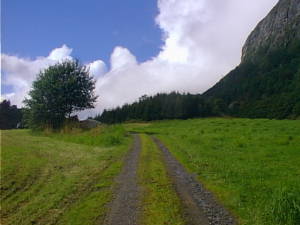Wednesday 26 September 2001

|
Pic of the day: For some of us, religion and science move along together, each part of a greater unity we call Truth. And yet truth is not a place, it is a Way. (Illustration photo from my vacation on Norway's west coast.) Religion & scienceReading Al Schroeder's Nova Notes the other day, I saw this interesting entry from September 24. Leaning heavily on an article about anthropic coincidences, Schroeder thinks that science has virtually proved God. Now he wonders, why is the reaction from established religions lukewarm at best? I shall here not debate the logic of seeing anthropic coincidences as proof of a cosmic Creator. It is indeed intriguing that so many small things had to be just right for life to exist at all. For the good of all, I shall just move on to the sluggish repsonse from established religion. ***A vague, if persuasive, indication of a cosmic Creator is not all that useful to religion. The context in which it is found is actually contradictory to most religious creation myths: That Earth was made 6000 years ago, or was fished up from the deep water by a god, or is carried on the back of a giant turtle. Or elephant. Or both of the above. Any literal reading of holy scriptures is likely to collide head-on with modern science. This already excludes some faiths right off the bat, and others will feel slightly uncomfortable and not want to draw attention to a potentially divisive re-interpretation of their mythos. In plain English, they want to keep both those who believe in the turtle and those who believe in gravity. But even when there is no literalist tradition, a cosmic Creator is still not specific enough to validate any single religion. You can't out of the anthropic principle say that Jehovah is the True God, or that Muhammad is Allah's Prophet, or that Jesus Christ rose from the grave and ascended to Heaven. In fact, the anthropic principle does little more than verify what most people have thought all the time: There must be something greater than us somewhere, something really big. But religion isn't about that. Religion isn't simply theism. (Well, except perhaps certain brands of Unitarianism, which reportedly look less like religion and more like an excuse to party. Then again, my sample is very limited.) On the contrary, a cosmic deity with a flair for mathematics and physics seems strangely inappropriate for traditional religion. Would such a person - if we can even call it a person - really worry about people having sex at the right time with someone of the right gender or even ethnicity? Would a cosmic Creator really get very emotional about people eating the muscle tissue of some animals and not others? The cosmic Creator has not just witnessed, but set in motion the birth and death of billions and billions of galaxies. And even here on our little blue marble, the Creator has arranged the rise and extinction of a billion species. What chance is there for such a Being to feel the fear and the grief of a single human? Are we filled with joy for each raindrop that takes shape high in the air, and do we grieve when it hits the sea, do we strive to trace its waves among all the other waves in a rainstorm, do we remember its individuality after it has once again become one with the ocean? The sheer immensity of the cosmic Creator makes it a lousy deity: One that commands awe, yes, but not love. We may be grateful for existing, but how can we express gratitude to someone to whom galaxies are less than test tubes? ***The cosmic theories about an Intelligent Designer then is simply too remote to associate with most people's religious experience. But there is more. There is simply no way for most theologians to confirm these theories independently. Including them in dogma would require faith, not in a deity, but in a group of scientists. What then in a few years when new theories render these worthless? When I was a child, it was widely believed that the universe had always existed, and that new matter was spontaneously created in the emptyness between the expanding galaxies. Then, for most of my life, the most common understanding was that the universe would halt its expansion eventually and implode in a Big Crunch. (As a matter of fact, a quasi-religious theory was based on this assumption ... that the Omega Point of evolution would eventually coincide with the Omega Point of the collapsing universe, when all things would once again be One.) Truths don't last long in cosmology. It is no big surprise that churches and synagogues are reluctant to trade in truths that have survived for millenia, and build upon the foundation of man-made truths with a half-life of perhaps 10 years. To reconcile science and religion is not a deal that can be done and over with. It is a process, and only a few have the resources and the courage - or desperation - to stand in it. |
Yesterday <-- This month --> Tomorrow?
One year ago
Two years ago